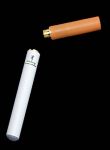 The electronic cigarette has fast become one of the hottest recent products, and it’s currently in the midst of a still-unfolding court battle involving the Food and Drug Administration (FDA). But a new court ruling could prove very telling as to how this conflict is going to play out.
The electronic cigarette has fast become one of the hottest recent products, and it’s currently in the midst of a still-unfolding court battle involving the Food and Drug Administration (FDA). But a new court ruling could prove very telling as to how this conflict is going to play out.
Last Thursday, a the U.S. District Court in Washington, DC ruled that the FDA will most likely not have authority over e-cigarettes as drug-delivery devices. Instead, the agency will probably have to regulate them as tobacco products, in the same way that traditional cigarettes are regulated.
For now, the FDA is prohibited from taking action. Previously, the FDA had asserted that e-cigarettes were unapproved drug-delivery devices, and as such would fall under the U.S. Food, Drug and Cosmetic Act. Nevertheless, at least until the court can fully review the case and render a final decision, the product will have to be regulated under the Family Smoking Prevention and Tobacco Control Act.
Although no final decision has yet been made, the injunction indicates that the court believes the case against the FDA will most likely succeed, and thus e-cigarettes will not be regulated as drug-delivery devices.
The suit began due to shipments of the product being detained by the FDA. The shipments were from two major e-cigarette distributors, Smoking Everywhere and NJOY, who subsequently brought suit.
Confusion over the definition of tobacco products in general, and how that definition relates to e-cigarettes in particular, has led to some controversy. For instance, the Family Smoking Prevention and Tobacco Control Act defines tobacco products as “any product made or derived from tobacco that is intended for human consumption.” E-cigarettes contain nicotine derived from real tobacco, which could very well define e-cigarettes as “tobacco products”.
However, the FDA had been maintaining that since e-cigarettes are designed to affect the body in the same way cigarettes do, this would classify them under the Act as a drug-delivery device, thus making them an exception to the “tobacco product” classification. The court disagreed, however, reasoning that by that rationale, cigarettes themselves would be exempt from the Act, since they, too, affect the structure and function of the body.
Since e-cigarettes have been marketed primarily as an alternative to traditional smoking, and not as therapeutic nicotine cessation devices (such as the nicotine patch), the court has found this to be another reason they should not, for the time being at least, be consider drug-devices.
